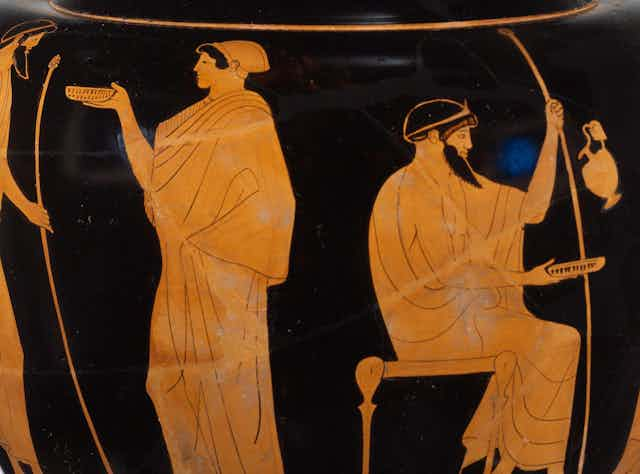Ancient Greece was in many ways a brutal society. It was almost perpetually at war, slavery was routine and women could only expect a low status in society.
However, there is one important sense in which ancient Greeks were more advanced than modern European societies: their sophisticated political systems. The citizens of ancient Athens developed a political system that was more genuinely democratic than the present day UK or US.
Our modern concept of democracy is actually a degradation of the original Greek concept and has very little in common with it. Modern democracy is merely representative, meaning that we elect officials to make decisions on our behalf, who become members of legislative bodies like the British parliament or the US Congress.
The ancient Greeks practised direct democracy. It literally was “people power”. And they took measures specifically to ensure that ruthless, narcissistic people were unable to dominate politics.
Recent political events show that we have a great deal to learn from the Athenians. Arguably, a key problem in modern times is that we aren’t stringent enough about the people we allow to become politicians.
There’s a great deal of research showing that people with negative personality traits, such as narcissism, ruthlessness, amorality or a lack of empathy and conscience, are attracted to high-status roles, including politics.
In a representative democracy, therefore, the people who put themselves forward as representatives include a sizeable proportion of people with disordered personalities – people who crave power because of their malevolent traits.
And the most disordered and malevolent personalities –the most ruthless and amoral – tend to rise to the highest positions in any political party, and in any government. This is the phenomenon of “pathocracy”, which I discuss at length in my new book DisConnected.
Numerous American mental health professionals have argued that Donald Trump has a serious personality disorder which made him unfit for the role of president. This included the president’s niece, Mary Trump – a qualified psychologist.
One of the key concerns was his apparent failure to take responsibility for his actions or mistakes. Under Trump, the US government effectively became a pathocracy.

In the UK, Boris Johnson has shown similar personality traits. The most recent example was his petulant, narcissistic reaction to the House of Commons report that found he had deliberately misled parliament on multiple occasions while in office.
Time and again, Johnson has arguably shown a self-deluded inability to admit to mistakes or take responsibility for his actions – along with traits of dishonesty and glibness – which are characteristic of a “dark triad” personality.
Ancient democratic practices
The ancient Athenians were very aware of the danger of unsuitable personalities attaining power. Their standard method of selecting political officials was sortition – random selection by lot. This was a way of ensuring that ordinary people were represented in government, and of safeguarding against corruption and bribery.
The Athenians were aware that this meant a risk of handing responsibility to incompetent people but mitigated the risk by ensuring that decisions were made by groups or boards. Different members of the group would take responsibility for different areas and would act as a check on each other’s behaviour.
Athenian democracy was direct in other ways too. Political decisions, such as whether to go to war, the election of military leaders or the nomination of magistrates, were made at massive assemblies, where thousands of citizens would gather.
A minimum of 6,000 citizens was required to pass any legislation. Citizens usually voted by showing hands – also sometimes with stones or pieces of broken pottery – and decisions were carried by simple majority.
The ancient Athenians also practised a system of ostracism, not dissimilar to some egalitarian hunter-gatherer groups (who were also aware of the danger of alpha males dominating the group). Ostracisms took place annually, when disruptive people who threatened democracy were nominated for expulsion.
If a sufficient number of citizens voted in favour, the disruptors would be banished from the city for ten years. In a sense, the decision to deny Johnson a former member’s parliamentary pass can be seen as a form of ostracism to protect against his corrupting influence.
A return to direct democracy
Sortition is still used in modern democracies, most notably in jury service, but these ancient democratic principles could be used much more widely to positive effect.
In fact, in recent years, many political thinkers have recommended reviving sortition in government. In 2014, Alexander Guerrero, professor of philosophy at Rutgers University, published an influential paper advocating what he called “lottocracy” as an alternative to representative democracy.
In this system, government is undertaken by “single-issue legislatures” assemblies that focus on specific issues such as agriculture or healthcare. Members of the legislatures are chosen by lot and make decisions after consulting experts on the relevant topic.
The political scientists Hélène Landemore has advocated a similar model in which assemblies of randomly selected citizens (ranging in size from a 150 to 1,000) make political decisions.
Landemore’s model of “open democracy” also includes referendums and “crowd-sourced feedback loops” (when large numbers of people discuss policies on internet forums, and the feedback is passed to legislators).
In addition, the political philosopher John Burnheim has used the term demarchy for a political system made of small randomly selected “citizen’s juries” who discuss and decide public policies.
Such measures would be a way of reducing the likelihood of people with personality disorders attaining power since they would make leadership positions less attractive to ruthless and amoral people.
Direct democracy means less individual power and more checks and limitations to individual authority. Governments and organisations become less hierarchical, more cooperative than competitive, based on partnership rather than power.
This means less opportunity for disordered people to satisfy their craving for dominance in the political sphere. We would then become free of pathocracy, and all of the chaos and suffering it causes.

